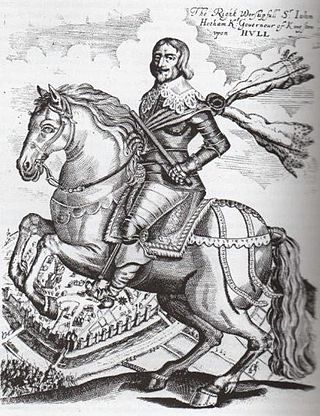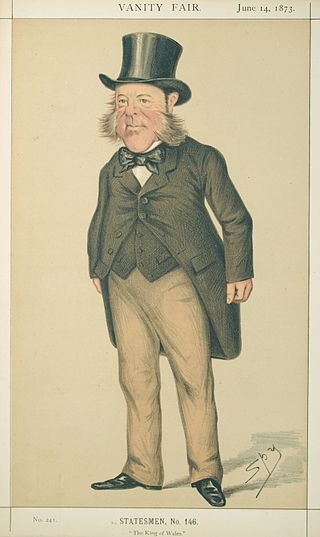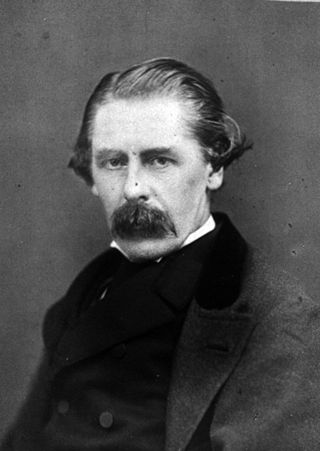
The Thompson Baronetcy, of Wimpole Street in the City of London, was created in the Baronetage of the United Kingdom on 20 February 1899 for the surgeon Sir Henry Thompson. [1] The title became extinct on the death of the second Baronet in 1944.

The Thompson Baronetcy, of Wimpole Street in the City of London, was created in the Baronetage of the United Kingdom on 20 February 1899 for the surgeon Sir Henry Thompson. [1] The title became extinct on the death of the second Baronet in 1944.
Physician to the King is a title held by physicians of the Medical Household of the Sovereign of the United Kingdom. Part of the Royal Household, the Medical Household includes physicians, who treat general conditions, and extra physicians, specialists who are brought in as required.
Williams-Wynn is a surname. It may refer to:

The Sheriff is the oldest secular office under the Crown. Formerly the Sheriff was the principal law enforcement officer in the county but over the centuries most of the responsibilities associated with the post have been transferred elsewhere or are now defunct, so that its functions are now largely ceremonial.

The Bunbury Baronetcy, of Bunbury, Oxon and Stanney Hall in the County of Chester, is a title in the Baronetage of England. It was created on 29 June 1681 for Thomas Bunbury, Sheriff of Cheshire from 1673 to 1674 and the member of an ancient Cheshire family. His grandson, Henry, the third Baronet, and great-grandson, the fourth Baronet, both sat as Members of Parliament for Chester. The latter died unmarried at an early age and was succeeded by his younger brother, the fifth Baronet. He was a clergyman. On his death in 1764 the title passed to his eldest son, the sixth Baronet. He represented Suffolk in the House of Commons for over forty years but is best remembered for his marriage to Lady Sarah Lennox. He died childless in 1821 and was succeeded by his nephew, the seventh Baronet. He was the son of Henry Bunbury, younger son of the fifth Baronet. The seventh Baronet was a distinguished soldier and politician. His eldest son, the eighth Baronet, was High Sheriff of Suffolk in 1868, and Fellow of the Royal Society. He died childless in 1886 and was succeeded by his younger brother, the ninth Baronet. He was Liberal Member of Parliament for Bury St Edmunds. He died unmarried in 1895 and was succeeded by his nephew, the tenth Baronet. He was the son of Colonel Henry William St Pierre Bunbury, third son of the seventh Baronet. He served as High Sheriff of Suffolk in 1908 and was a Deputy Lieutenant of the county. On his death in 1930 the title passed to his son, the eleventh Baronet. He was High Sheriff of Suffolk in 1936 and was a Deputy Lieutenant of the county. His son, the twelfth Baronet, was High Sheriff of Suffolk in 1972. As of 2014 the title was held by the latter's second but eldest surviving son, the thirteenth Baronet, who succeeded in 1985.

This is a list of Sheriffs of Derbyshire from 1567 until 1974 and High Sheriffs since.

Lt-Col. Sir Watkin Williams-Wynn, 6th Baronet was a Welsh Conservative Party politician who sat in the House of Commons from 1841 to 1885.
This is a list of the sheriffs and high sheriffs of Staffordshire.
The office of Sheriff of Sussex was established before the Norman Conquest. The Office of sheriff remained first in precedence in the counties until the reign of Edward VII when an Order in Council in 1908 gave the Lord-Lieutenant the prime office under the Crown as the Sovereign's personal representative.
Six baronetcies have been held by the Grant family.
This page is a list of High Sheriffs of Glamorgan. Sheriffs of Glamorgan served under and were answerable to the independent Lords of Glamorgan until that lordship was merged into the crown. This is in contrast to sheriffs of the English shires who were from the earliest times officers of the crown. Sheriffs in the modern sense, appointed and answerable to the crown, were instituted in the county of Glamorgan in 1541.
Sir Henry Francis Herbert Thompson, 2nd Baronet was a British Egyptologist.
Henry Thompson may refer to:

Sir Henry Thompson, 1st Baronet, was a British surgeon and polymath. His interest was particularly in the surgery of the genito-urinary tract.
The High Sheriff of Kerry was the British Crown's judicial representative in County Kerry, Ireland from the 16th century until 1922, when the office was abolished in the new Free State and replaced by the office of Kerry County Sheriff. The sheriff had judicial, electoral, ceremonial and administrative functions and executed High Court Writs. In 1908, an Order in Council made the Lord-Lieutenant the Sovereign's prime representative in a county and reduced the High Sheriff's precedence. However, the sheriff retained his responsibilities for the preservation of law and order in the county. The usual procedure for appointing the sheriff from 1660 onwards was that three persons were nominated at the beginning of each year from the county and the Lord Lieutenant then appointed his choice as High Sheriff for the remainder of the year. Often the other nominees were appointed as under-sheriffs. Sometimes a sheriff did not fulfil his entire term through death or other event and another sheriff was then appointed for the remainder of the year. The dates given hereunder are the dates of appointment. All addresses are in County Kerry unless stated otherwise.